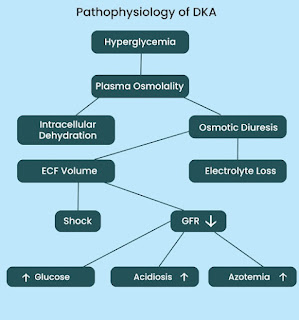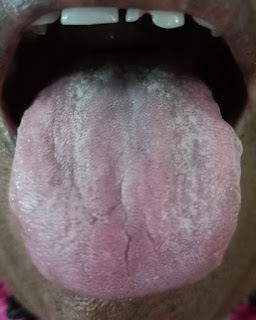INTERNSHIP ASSESSMENT
K.SHUBANKAR
ROLL NO - 144
2O17 BATCH
I was posted as internee in the department of GENERAL MEDICINE from 12-06-2023 to 11-06-2023. During this period as an intern I have been posted in
UNIT 6 for 1 month ,
Peripherals (ICU , NEPHROLOGY and MEDICINE WARD) for 15 days
Psychiatry department for 15 days
Unit Duties:
I was posted in unit 6 under SR Dr. Sushmitha and PG’s - Dr.Nishitha, Dr.Pavan, Dr.Harika, Dr.Nithin
Unit duties mainly consist of OP days, along with looking after casualty cases and overall monitoring and treatment regimens of the patients that get admitted under your care.
These are the blog links of some interesting cases that I saw which were admitted during my time in unit-6
https://shubankarkandukuri.blogspot.com/2023/07/30-year-old-male-with-dka-kco-diabetes.html
Learning points:
1)WHAT IS DIABETIC KETOACIDOSIS?
Diabetic ketoacidosis is a serious complication of diabetes.The condition develops when the body can't produce enough insulin. Insulin plays a key role in helping sugar — a major source of energy for muscles and other tissues — enter cells in the body.Without enough insulin, the body begins to break down fat as fuel. This causes a buildup of acids in the bloodstream called ketones. If it's left untreated, the buildup can lead to diabetic ketoacidosis.
2)PATHOPHYSIOLOGY OF DIABETIC KETOACIDOSIS?
3)CAUSES OF DIABETIC KETOACIDOSIS
Diabetic ketoacidosis usually happens after:
- An illness:Pneumonia and urinary tract infections are common illnesses that can lead to diabetic ketoacidosis.
- A problem with insulin therapy
- Physical or emotional trauma
- Heart attack or stroke
- Pancreatitis
- Pregnancy
- Alcohol or drug misuse, particularly cocaine
- Certain medicines, such as corticosteroids and some diuretics
https://shubankarkandukuri.blogspot.com/2023/08/blog-post_9.html
Learning points:
1)WHAT IS HYDRONEPHROSIS?
Hydronephrosis is a condition in which one or both kidneys become swollen due to incomplete emptying of the urinary tract. It can be sudden or chronic, partial or complete, one-sided or bilateral. It can occur anywhere along the urinary tract from the opening of the kidneys to the ureters (draining the kidneys to the bladder), the bladder, and the urethra (draining the bladder). Problems with any of these structures may cause impaired emptying of the urinary system and back up of fluid and pressure
2)WHAT ARE CAUSES OF HYDRONEPHROSIS?
In adults, the conditions that most often cause hydronephrosis include:
- Kidney stones: Stones that may become lodged in the kidneys or urinary tract.
- Cancer: Tumors in the bladder,prostate gland,uterus or other organs that are part of or near the urinary tract may cause blockages that disrupt the flow of urine.
- Benign Prostatic hyperplasia:Enlargement of the prostate gland in men can cause pressure on the urethra, the tube that urine passes through before it leaves the body.
- Having blood clots: Blood clots can develop in the kidney or ureter.
- Narrowing or stricture of the urinary tract: This narrowing can be due to injury, infection, birth defects or surgery.
- Nerve or muscle problems: These problems can affect the kidneys or ureters, such as from diabetes mellitus.
- Urinary retention: Urine may be held inside the body due to an inability to empty the bladder.
- Vesicoureteral reflux: This is a condition when urine flows backward from the bladder to the kidneys.
- Uterocele: This is a condition where the lower part of the ureter may protrude into the bladder.
In women, hydronephrosis may occur as a result of:
- Pregnancy: As your uterus expands, it can press on the ureters and block the flow of urine.
- Uterine prolapse: A condition in which your uterus sags or slips out of its normal position.
- Cystocele: A condition that occurs when the wall between your bladder and vagina weakens and allows your bladder to droop into your vagina.
https://shubankarkandukuri.blogspot.com/2023/08/49f-pyrexia-under-evaluation-uti-with.html
LEARNING POINTS:
1)What is STEVEN JOHNSON SYNDROME?
Stevens-Johnson syndrome (SJS) is a rare, serious disorder of the skin and mucous membranes. It's usually a reaction to medication that starts with flu-like symptoms, followed by a painful rash that spreads and blisters. Then the top layer of affected skin dies, sheds and begins to heal after several days.
2)CAUSES OF STEVEN JOHNSON SYNDROME?
Drugs that can cause Stevens-Johnson syndrome include:
- Anti-gout medications, such as allopurinol
- Medications to treat seizures and mental illness (anticonvulsants and antipsychotics)
- Antibacterial sulfonamides (including sulfasalazine)
- Nevirapine (Viramune, Viramune XR)
- Pain relievers, such as acetaminophen (Tylenol, others), ibuprofen (Advil, Motrin IB, others) and naproxen sodium (Aleve).Infections that can cause Stevens-Johnson syndrome include pneumonia and HIV.
Unit duty was a great opportunity to be able to learn how to handle a multitude of patients and about treatment and evaluation of different cases.
Our OP days are on Saturdays, and we see around 70 to 100 cases per day. We had a great opportunity to take history from the patients and evaluate them and come to a diagnosis with the help of PGs and SR. I got to know what are the specific history to be asked to a particular case and the importance of history taking in diagnosing the case. As there would be lots of patients waiting, OP days are great opportunity where we learn how to assess the patients in short time efficiently. I also learnt what are the real essential diagnostic tests required for a particular case to diagnose it.. instead of sending some random routine investigations. I had a great opportunity to do clinical examination of patients which plays a very vital role in diagnosis.
I got to know how to interpret different ECGs, 2D ECHO’s, X-rays which help us in evaluating each case.
After the investigations , here comes the ultimate part for which patient comes to the hospital to get relief from their Ill health,that is treatment ..In the OP days I had opportunity to learn what is the treatment given for each case
Sometimes patients used to come with different problems related to DVL , orthopedics, Surgery.... not only related to General medicine, During the OP days , I had opportunity to evaluate the patient and what is the reason for the problem and take them to the concerned department for examination and treatment.Here I got to know the importance of multi system approach and it's importance in treatment of patients.
I realised,Treating the patient just once is not enough , because some of our patients come to the OPD with the same complains again and again or sometimes the problem may even worsen then I understood the importance of follow up of patients. So we created pajr groups for the OP patients , which is a great initiative by our HOD sir
ICU and AMC duties
Worked in ICU and AMC for 5 days under Dr. sVenkat and Dr.Navya
Normally even during the other duties I used to go and attend rounds in ICU and got the cases .But only during the 5 days of posting in ICU I got to the importance of ICU and the care the patients here need. I got to know how to differentiate between seriousness of cases and which cases to be shifted to ICU and AMC and which ones to ward.
It was a great learning experience where , I we get both knowledge and gain clinical skills which are really essential.
I got opportunity to draw many blood samples and the vacutainers which are used . I got opportunity to draw ABG samples , intially PG helped me in drawing ABG samples,later I got opportunity to draw around 10 to 15 samples during those 5 days.
I got opportunity to learn, how to place and Remove ryles tube and placed ryles tube to 2 patients . Observed what are the feeds given and the timings of the feeds through NG tube.
Got opportunity to learn life saving skill CPR and Done CPR for 2 patients in ICU who went into cardiac arrest.
Got opportunity Insert foleys to 6 patients
Assisted in placing Central line for 2 patients
Done 2 ascitic taps under the guidance of PG
Nephrology Duties:
I have done nephrology duties under the guidance of Dr.Narsimha and Dr.Govardhini
Got opportunity to learn and closely observe the dialysis unit. Got to know the importance of dialysis and the need to monitor the patients undergoing dialysis.
Importance of AV fistulas
Seen cases which worsen during the dialysis
Monitered patients while undergoing blood transfusion
Ward duty:
During unit duty I used to take care of only unit patients even if I know what are all the cases present. Ward duty is a great opportunity to learn about all the patients.
I got to know about different types of cases in the ward. Collected the detailed history of patients. Here I realised the importance of history taking in diagnosing and treating the patient.
Created paJr groups for following the patients even after the got discharged.
Psychiatry postings:
I was posted in the department of psychiatry for 15 days.
During my UG days when I attended postings I used to think that Psychiatry is very fascinating ..as the history of the patients is very interesting and each patient has a different story and history.
But during the internship I realised the depth of the subject. Got to see many cases of Schizophrenia.,but each of them have different approach of diagnosis and treatment.
Saw cases of Depression, Generalized anxiety disorder, Panic attacks, Bipolar disorder, Delirium, Substance abuse, Alcohol dependency
Used to go to de addiction ward and saw what are the activities they make the patients do and their treatment.
Monitored patients in ward with delirium
But what I observed is even now Many patients donot approach psychiatrist due to lack of awareness and social stigma. Patients What we see in OPD are just tip of the iceberg...many patients who are really in need of psychiatrists needs to get treated.
In this 15 days , I also learnt how to diagnose and counsel the patients with psychiatric disorders and the treatment given.




Comments
Post a Comment